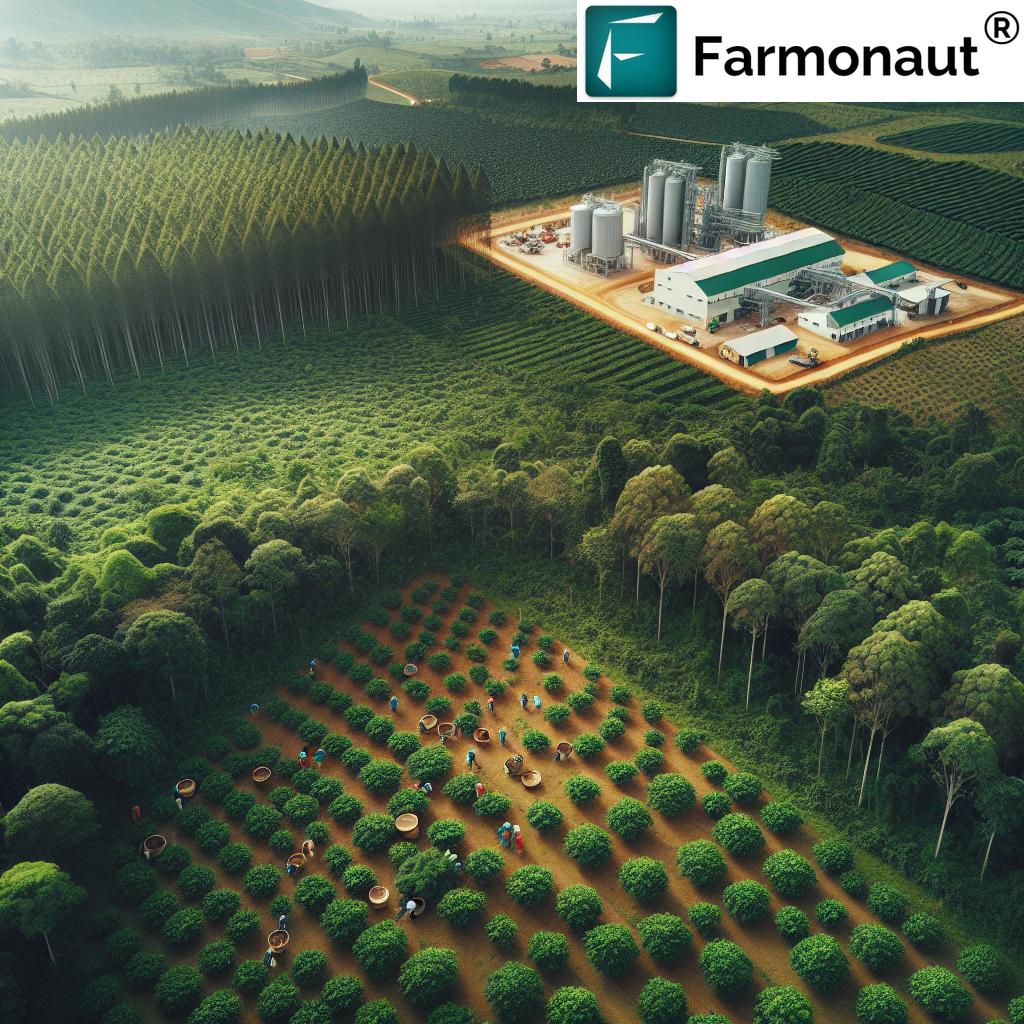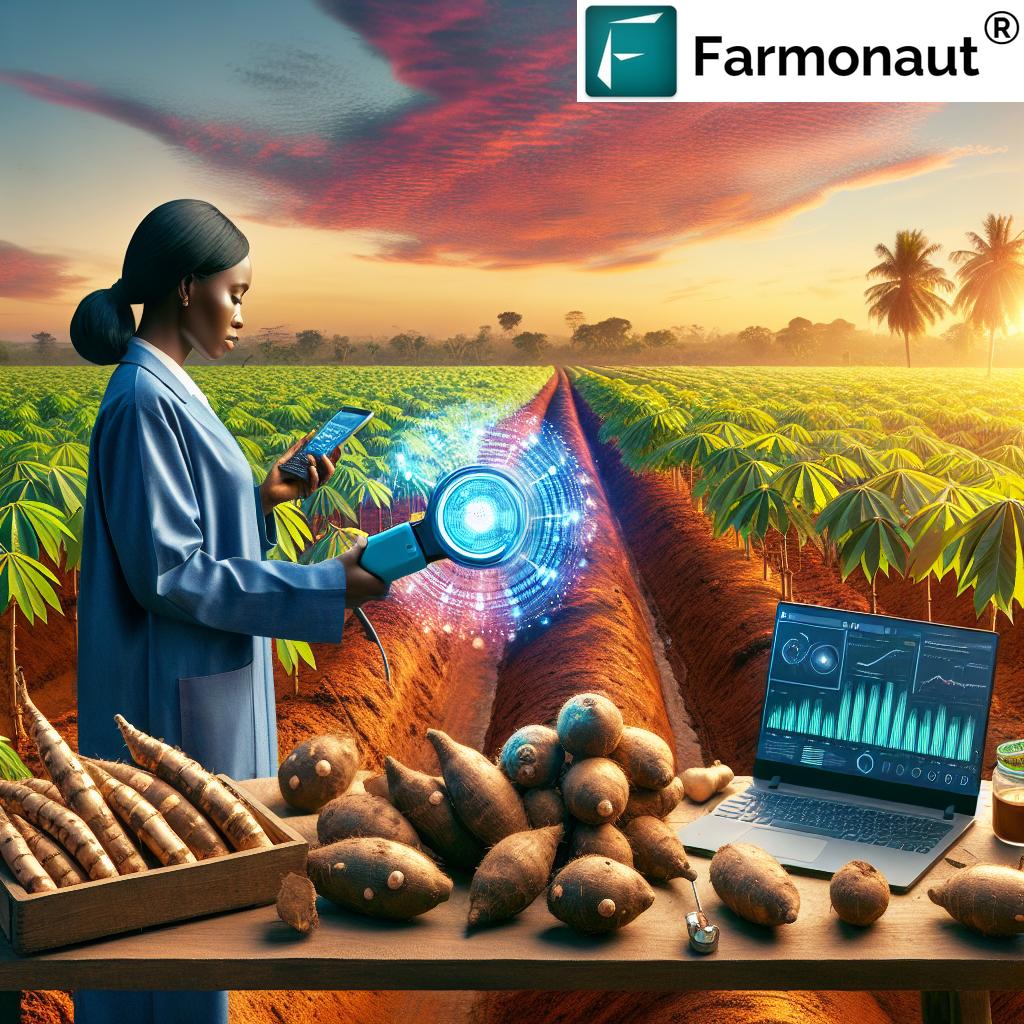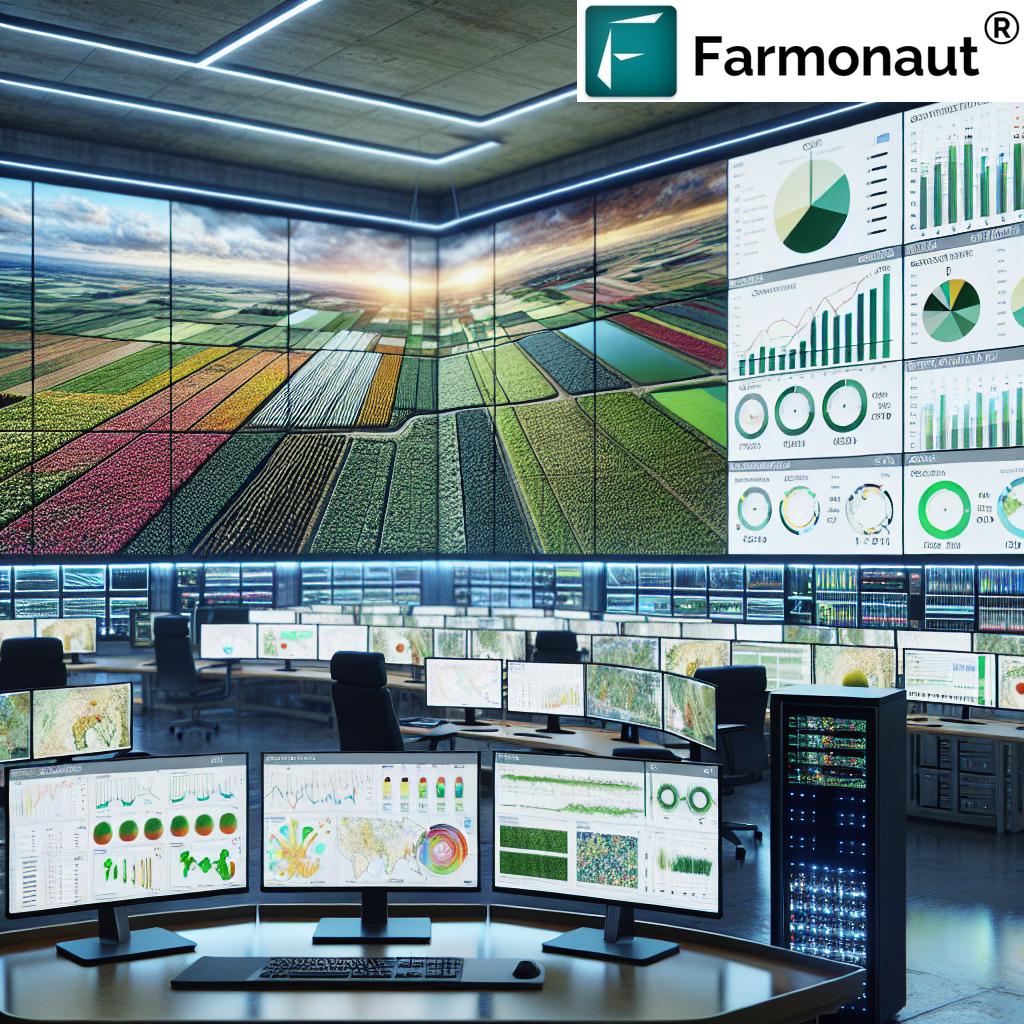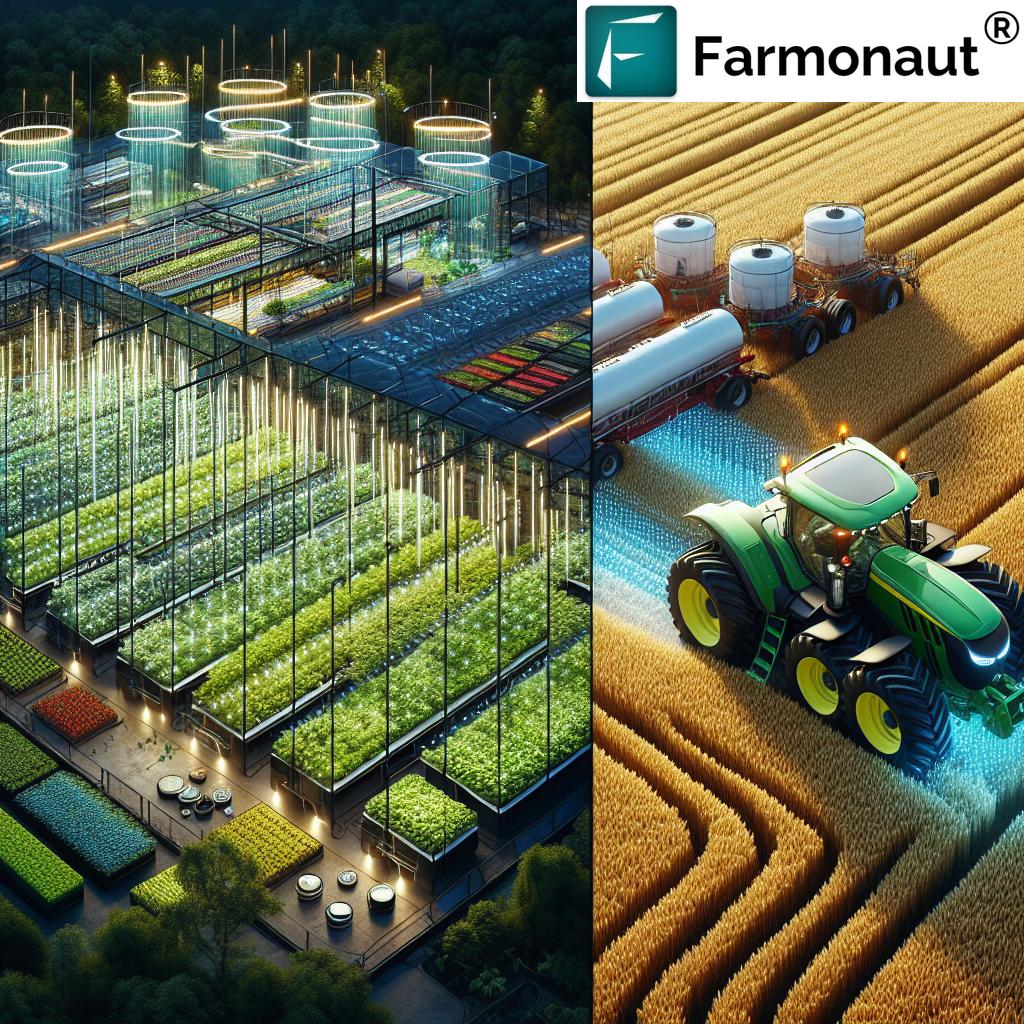EUDR Compliance for Coffee: How Farmonaut’s Geolocation Data Ensures Sustainable Supply Chains in Africa

“The EU Deforestation Regulation affects over 3 million smallholder coffee farmers in Africa, impacting global supply chains.”
As we delve into the complexities of the EU Deforestation Regulation (EUDR) and its impact on the coffee industry, particularly in Africa, we find ourselves at the forefront of a significant shift in global sustainability efforts. The EUDR is set to transform how coffee is produced, traded, and consumed, with far-reaching implications for farmers, operators, and consumers alike. In this comprehensive exploration, we’ll uncover the challenges and opportunities presented by this new regulation, and how innovative solutions like Farmonaut’s geolocation data are paving the way for sustainable, compliant coffee supply chains.
Understanding the EU Deforestation Regulation (EUDR)
The European Union has long been at the forefront of environmental protection and sustainable development. The EUDR represents a bold step towards combating global deforestation and forest degradation. Set to come into effect on December 30, 2025, for large companies and June 30, 2026, for small enterprises, this regulation aims to ensure that products sold within the EU do not contribute to deforestation or forest degradation worldwide.
For the coffee industry, the implications are profound. Coffee, as one of the world’s most traded agricultural commodities, is squarely in the spotlight. The regulation stipulates that all coffee entering the EU market must be “deforestation-free” as of December 30, 2020, and comply with all relevant laws in the country of origin.
Key Requirements of EUDR for Coffee Operators
- Traceability: Operators must provide detailed information about the origin of their coffee, including geolocation data of coffee plots.
- Due Diligence: Companies are required to conduct thorough risk assessments and implement mitigation measures to ensure their supply chains are deforestation-free.
- Compliance Statements: Operators must compile and maintain Due Diligence Statements (DDS) for at least five years, detailing their compliance efforts.
- Data Management: Implementation of robust systems to collect, verify, and store relevant data throughout the supply chain.
These requirements pose significant challenges, especially considering that 84% of coffee farms are small (under two hectares) and often lack sophisticated traceability systems. The burden of compliance threatens to disproportionately affect smallholder farmers, particularly in developing regions of Africa.
The Impact on African Coffee Farmers
Africa, with its rich coffee-growing heritage, stands at a critical juncture. The continent’s smallholder farmers, who form the backbone of the coffee industry, face unique challenges in meeting EUDR requirements:
- Technological Barriers: Many small farms lack access to advanced technology needed for precise geolocation and data collection.
- Financial Constraints: Implementing new systems and practices can be costly, potentially pricing out smaller producers from the EU market.
- Knowledge Gap: Understanding and implementing complex regulatory requirements presents a steep learning curve for many farmers.
The potential exclusion of these farmers from the EU market could have devastating economic consequences, underscoring the need for inclusive solutions that support rather than marginalize smallholder producers.
Farmonaut’s Role in EUDR Compliance
In the face of these challenges, innovative solutions are emerging to bridge the gap between regulatory requirements and on-the-ground realities. Farmonaut, a pioneering agricultural technology company, is at the forefront of this transformation, offering advanced, satellite-based farm management solutions that are particularly well-suited to addressing EUDR compliance challenges.
“Farmonaut’s geolocation data can map coffee plots with 95% accuracy, ensuring EUDR compliance for sustainable production.”
Geolocation Data: The Cornerstone of Compliance
One of the most critical components of EUDR compliance is the ability to provide accurate geolocation data for coffee plots. Farmonaut’s satellite-based crop health monitoring system offers a powerful solution to this challenge. By leveraging multispectral satellite imagery, Farmonaut can:
- Accurately map coffee plantations, even in remote or difficult-to-access areas
- Monitor crop health and detect changes in land use over time
- Provide data on vegetation health (NDVI) and soil moisture levels, supporting sustainable farming practices
This technology not only meets EUDR requirements but also empowers farmers with valuable insights to improve their productivity and sustainability.
Explore Farmonaut’s solutions:
Blockchain-Based Traceability
Farmonaut’s blockchain-based product traceability solution addresses another crucial aspect of EUDR compliance: the need for transparent, verifiable supply chain data. This technology:
- Ensures every stage of the coffee’s journey from farm to consumer is recorded and immutable
- Enhances trust and reduces the risk of fraud in supply chains
- Facilitates easy compilation of Due Diligence Statements (DDS) required by EUDR
By implementing this system, coffee operators can confidently demonstrate the origin and journey of their products, meeting EUDR’s stringent traceability requirements.
Implementing Sustainable Farming Practices
EUDR compliance goes beyond traceability; it also requires demonstrating sustainable farming practices. Farmonaut’s platform supports this through:
- AI-Driven Advisory: The Jeevn AI system provides personalized recommendations for sustainable crop management.
- Resource Optimization: Tools for efficient water and fertilizer use, reducing environmental impact.
- Carbon Footprint Tracking: Helping farms monitor and reduce their emissions, aligning with global sustainability goals.
These features not only aid in EUDR compliance but also contribute to the long-term sustainability and profitability of coffee farms.
Navigating Risk Assessment and Mitigation
A critical component of EUDR compliance is conducting thorough risk assessments. Farmonaut’s earth observation algorithms and data analytics capabilities provide valuable support in this area:
- Analyzing historical land use data to identify potential deforestation risks
- Assessing proximity to forests and protected areas
- Monitoring for signs of forest degradation or illegal land conversion
By leveraging these insights, coffee operators can implement effective risk mitigation strategies and demonstrate due diligence in their supply chains.
For developers looking to integrate these capabilities: Farmonaut API
API Documentation: Developer Docs
The Future of Sustainable Coffee Farming in Africa
As the coffee industry grapples with EUDR implementation, the future of sustainable coffee farming in Africa hinges on the adoption of innovative technologies and practices. Farmonaut’s solutions offer a pathway to compliance that is accessible and beneficial to farmers of all scales. By embracing these tools, African coffee producers can:
- Maintain access to the lucrative EU market
- Improve their farming practices and yields
- Contribute to global efforts to combat deforestation
- Enhance their resilience in the face of climate change
The journey towards full EUDR compliance will require collaboration across the sector, from smallholder farmers to large corporations and regulatory bodies. By working together and leveraging advanced technologies, the coffee industry can ensure a sustainable, deforestation-free future for coffee production in Africa and beyond.
EUDR Compliance Checklist for Coffee Operators
| Compliance Area | EUDR Requirement | Farmonaut’s Solution |
|---|---|---|
| Geolocation Data | Precise location data for coffee plots | Satellite-based mapping with 95% accuracy |
| Deforestation Risk Assessment | Evaluation of deforestation risks in supply chain | Historical land use analysis and risk detection algorithms |
| Traceability | Transparent supply chain data from farm to consumer | Blockchain-based traceability system |
| Sustainable Farming Practices | Evidence of environmentally friendly production methods | AI-driven advisory for resource optimization and carbon footprint tracking |
| Due Diligence Statements | Comprehensive records of compliance efforts | Integrated data management and reporting tools |
Overcoming Implementation Challenges
While the path to EUDR compliance presents significant challenges, it also offers opportunities for innovation and improvement in the coffee sector. Some key strategies for overcoming these challenges include:
- Capacity Building: Investing in training and education for farmers and local cooperatives on EUDR requirements and sustainable practices.
- Technology Adoption: Facilitating access to affordable, user-friendly technologies like Farmonaut’s platform for smallholder farmers.
- Collaborative Approaches: Encouraging partnerships between large operators and smallholder farmers to share resources and knowledge.
- Policy Advocacy: Engaging with EU authorities to ensure the regulation’s implementation considers the realities of diverse coffee-producing regions.
By addressing these areas, the coffee industry can work towards a more inclusive and sustainable future that benefits all stakeholders in the supply chain.
The Role of Data in Shaping Sustainable Coffee Production
As we navigate the complexities of EUDR compliance, the importance of data cannot be overstated. Farmonaut’s advanced earth observation algorithms and remote sensing expertise play a crucial role in providing the accurate, timely data needed to make informed decisions and demonstrate compliance. This data-driven approach offers several benefits:
- Precision Agriculture: Optimizing resource use and improving yields through data-driven insights.
- Early Warning Systems: Detecting potential issues such as pest infestations or drought conditions before they escalate.
- Long-term Planning: Using historical data to inform future planting and management decisions.
- Compliance Reporting: Streamlining the process of compiling and submitting required documentation to EU authorities.
By leveraging these data capabilities, coffee producers and operators can not only meet EUDR requirements but also drive continuous improvement in their operations.
The Global Impact of EUDR on Coffee Supply Chains
While our focus has been on African coffee production, it’s important to recognize the global implications of the EUDR. As one of the world’s largest coffee markets, the EU’s regulatory stance will likely influence practices worldwide. This could lead to:
- A shift towards more sustainable production methods globally
- Increased demand for transparent, traceable supply chains in other markets
- Greater investment in technologies that support sustainable agriculture and forest conservation
- Potential changes in global coffee trade patterns as producers adapt to new requirements
As these changes unfold, solutions like Farmonaut’s will become increasingly valuable in helping the global coffee industry adapt and thrive in this new regulatory landscape.
Conclusion: A New Era for Sustainable Coffee
The EU Deforestation Regulation marks a significant milestone in the journey towards truly sustainable coffee production. While the challenges are substantial, particularly for smallholder farmers in Africa, the regulation also presents an opportunity to transform the industry for the better. By leveraging innovative technologies like those offered by Farmonaut, coffee producers and operators can not only comply with EUDR requirements but also improve their practices, increase efficiency, and contribute to global sustainability goals.
As we look to the future, it’s clear that the success of EUDR implementation will depend on collaboration, innovation, and a commitment to supporting all stakeholders in the coffee supply chain. With the right tools and approaches, we can ensure that the coffee industry not only meets regulatory requirements but also thrives in an era of increased environmental consciousness and consumer demand for sustainable products.
The journey towards EUDR compliance and sustainable coffee production is just beginning. By embracing technologies like Farmonaut’s geolocation data and traceability solutions, the coffee industry can lead the way in creating a more sustainable, transparent, and resilient future for all.

FAQ Section
Q: What is the EU Deforestation Regulation (EUDR)?
A: The EUDR is a European Union regulation aimed at preventing products sold within the EU from contributing to global deforestation. It requires companies to ensure their supply chains are deforestation-free and compliant with relevant laws in the country of origin.
Q: When does the EUDR come into effect?
A: The EUDR is set to come into effect on December 30, 2025, for large companies and June 30, 2026, for small enterprises.
Q: How does the EUDR affect coffee producers in Africa?
A: African coffee producers, especially smallholders, may face challenges in meeting EUDR requirements due to technological and financial constraints. However, it also presents opportunities for adopting sustainable practices and accessing premium markets.
Q: What role does Farmonaut play in EUDR compliance?
A: Farmonaut provides satellite-based farm management solutions that help coffee producers meet EUDR requirements. This includes accurate geolocation data, crop health monitoring, and blockchain-based traceability systems.
Q: How can smallholder farmers in Africa prepare for EUDR compliance?
A: Smallholder farmers can prepare by adopting technologies like Farmonaut’s platform, participating in training programs, and collaborating with larger operators or cooperatives to share resources and knowledge.
Q: What are the benefits of implementing EUDR-compliant practices?
A: Benefits include maintaining access to the EU market, improving farming practices and yields, contributing to global deforestation efforts, and enhancing resilience to climate change.
Q: How does blockchain technology contribute to EUDR compliance?
A: Blockchain technology ensures transparent and immutable records of the coffee’s journey from farm to consumer, facilitating the traceability requirements of the EUDR.
Q: Can Farmonaut’s solutions be integrated with existing farm management systems?
A: Yes, Farmonaut offers APIs that allow for integration with existing farm management systems, making it flexible for various operational setups.
Q: How does the EUDR impact the global coffee market beyond the EU?
A: The EUDR is likely to influence global coffee production practices, potentially leading to increased demand for sustainable and traceable coffee in other markets worldwide.
Q: What support is available for coffee producers transitioning to EUDR-compliant practices?
A: Support may be available through industry associations, government programs, and technology providers like Farmonaut, offering tools, training, and resources for compliance.
















